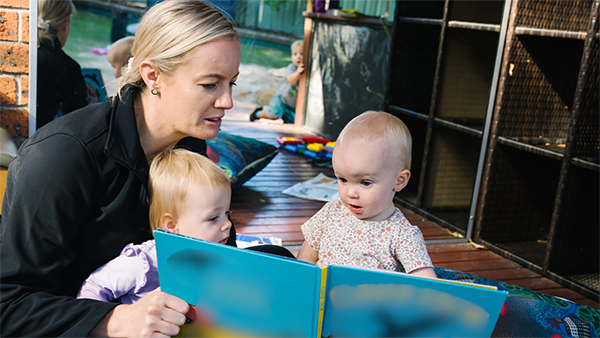
Sharing rhymes, songs, telling stories and reading books with your baby is a fun way to play and spend time together.
Importantly, it also starts to develop children’s speech and a love of reading. For very young babies, it introduces them to new and interesting words, provides time to practice babbling and speaking, as well as teaching them about how books work.
It’s never too early, or too late, to start reading with a baby. They may not understand the words at first, but they love hearing the sound of your voice and they learn that reading is important and fun. Most importantly, it is a wonderful opportunity to bond with your baby.
Reading with your baby
- Aim to spend some time every day sharing stories with your baby.
- Turn off TV/radio/phone, so you can both concentrate.
- Don’t rush. Make sure you speak slowly and clearly.
- Watch baby’s face. Smile or reply to baby’s sounds.
- Pause often. This way babies have the chance to understand.
- It may help to include reading as part of your baby’s routine, such as after nappy change, or before nap times and bed times.
- Follow their cues and continue while baby is engaged. If baby becomes hungry, tired, cries or turns their head away it is time to stop.
How to share books with your baby
- Choose books with large, bright pictures. Babies love pictures of babies and children, especially their faces.
- You can read the words or just talk about the pictures. Do plenty of pointing out of single objects, animals or people.
- They don’t have to look at the book. Babies find books fascinating, but will often look at you and make eye contact while you are reading. They are watching how you use your mouth to speak, and tuning in to your voice.
- Have fun with the story doing silly voices and make funny noises.
- Keep a selection of board books within reach – book baskets on your play mat, some in the car or pram, and at the highchair. Keep special books up on a shelf.
- Encourage everyone to read, talk and share stories with baby.
- As they get older let babies show books to you. Board books are strong so baby can grab pages and will even mouth them. It's ok, its all part of learning!
- Develop your own home library and choose books together. Borrow board books from your local library and discover new favourites together.
Step by step in learning
Babies begin to learn language skills from the moment they are born. Babies learn to talk by listening to people talk and read to them, and by babbling with sounds and words. It will take time before they are able to speak back to you, but their brain is busy developing the skills they need with every moment you spend talking, reading and playing together.
- Most babies will say their first words between 12 and 18 months. They will have a burst of language development before they turn two, and begin to join words together by two and a half years.
- Most three year olds will use three to four word sentences and be understood by familiar adults most of the time.
- By four, children will use four to five word sentences, use grammar correctly most of the time, and be understood by most people.
The more you read, sing and talk with your baby or child the more they’ll understand about language and words. So try and make rhymes, songs and reading books part of your daily routine.
(This article is contributed to by Raising Literacy Australia, a not-for-profit organisation committed to enriching Australian lives through literacy.)